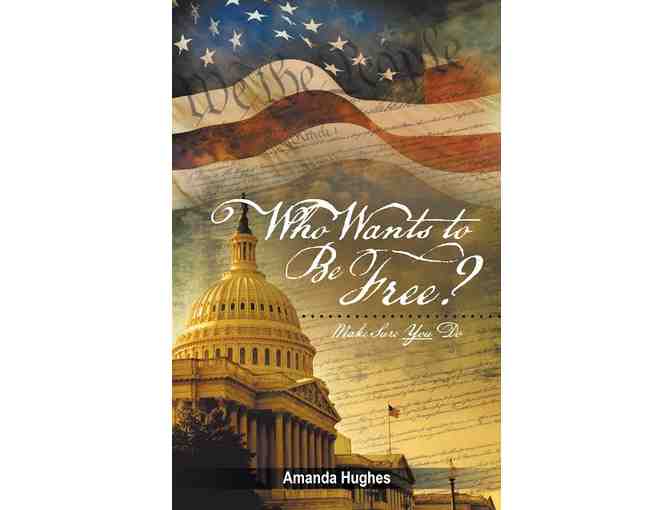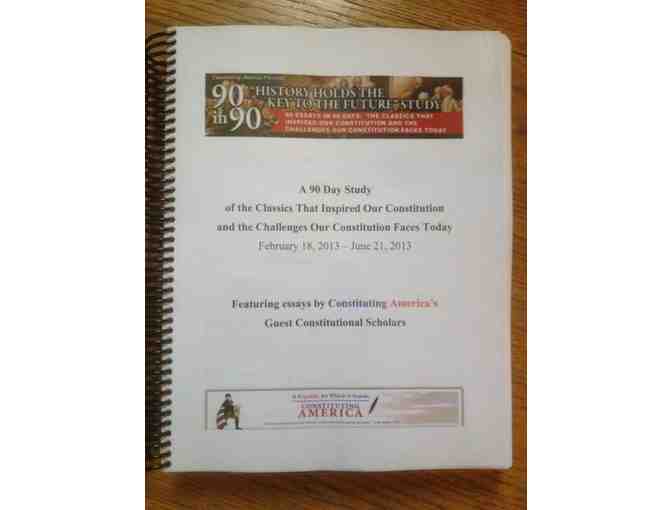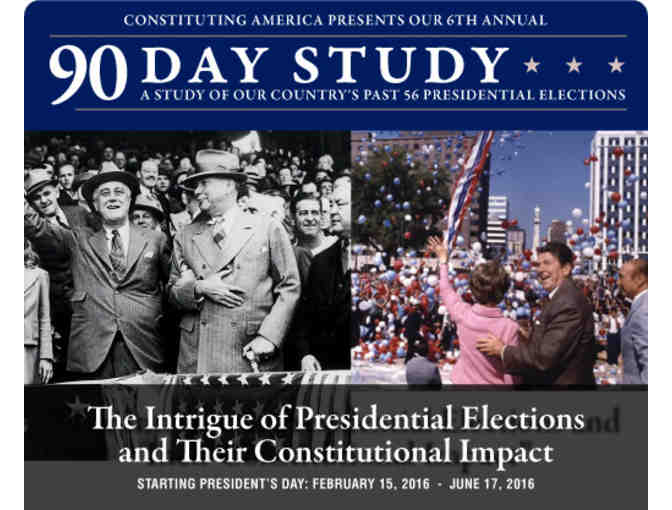Autographed Books
Amanda Hughes's Book, "Who Wants To Be Free"? Autographed!
- Item Number
- 108
- Estimated Value
- 15 USD
- Sold
- 10 USD to tg38dd40d
- Number of Bids
- 1 - Bid History
Item Description
Constituting America is very proud to have Amanda Hughes book, "Who Wants To Be Free?" (2016) on our auction and available in our bookstore! (Besides Amazon and Barnes & Noble)! Amanda will personally autograph and mail her book to you!
Amanda Hughes serves as Outreach Director, and 90 Day Study Director, for Constituting America. She is the author of Who Wants to Be Free? Make Sure You Do!, and a story contributor for the anthologies Loving Moments(2017), and Moments with Billy Graham (forthcoming).
Amanda Hughes, Outreach Director Constituting America
Phone: 888-937-0917
Amanda@ Constituting America.org
ConstitutingAmerica.org
Facebook.com/ConstitutingAmerica
Twitter: @ConstituteUS
Reviews:
"If you love your freedom and are concerned about the direction this nation is headed and don't know what to do about it, then this book is a great quick-start guide/manual for performing your civic duty. A common sense course in the basics of America's foundations and U.S. citizenship. An easy read with super practical ideas of how to get involved."
"At a time when so many Americans are worried about the direction our country is headed, this book is an uplifting, loving reminder of how we as American citizens can work to make a difference in our political process and ensure our freedoms are preserved. A rallying cry for Christians, Amanda skillfully weaves Biblical stories and principles into her narrative, reminding the reader that God has designed us for freedom but that freedom can slowly slip away if citizens are not diligent in getting educated and involved in the political process.Even if one is not particularly religious I would still recommend this book, for the pearls of wisdom regarding our nation’s founding, history and steps we can take to ensure our freedoms are not diminished can be appreciated by any American who wants to preserve liberty. The last chapter even includes a list of resources, websites and organizations to help a person figure out where to start in their journey to get more involved. In an age where the average voter may feel helpless and disenfranchised, Amanda’s book is a quick and easy read that packs a powerful message of how each and every one of us is not powerless but can indeed make a difference."
Amanda Hughes serves as Outreach Director, and 90 Day Study Director, for Constituting America. She is the author of Who Wants to Be Free? Make Sure You Do!, and a story contributor for the anthologies Loving Moments(2017), and Moments with Billy Graham (forthcoming).
Free shipping!
As our Outreach Director and 90 Day Study Director, Amanda helps bring our mission and message to you by representing us at nationwide conventions and the complex coordination she does to bring the "90 Day Studies" to life!
Amanda@ConstitutingAmerica.org
Amanda Hughes holds a Master of Arts in Christian Education from
Southwestern Baptist Theological Seminary. She serves as Outreach
Director for Constituting America, and enjoys encouraging others
through her writing on faith and freedom at AmandaHughesWriter.com.
Amanda writes:
"You are designed for freedom!
If you are a Christian in America wondering if you should know what is going on in your government, about leaders who represent you or whether to vote in elections, the answer is a resounding YES!
Who Wants to Be Free? invites you to discover:
- What defines freedom and why understanding it matters to you.
- What is at stake by ignoring your heritage as a Christian in America.
- Biblical principles about freedom that will help you cast a wise ballot.
- How to keep up with the issues and stay involved in politics without getting overwhelmed.
Today is full of opportunities to shine God's light on our nation through decisions we can make for, instead of against, our own freedoms and those of our fellow Americans!"
"WHO WANTS TO BE FREE?"
Product Details
|
Item Special Note
Amanda Hughes, Guest Essayist for 2018 90 Day Studies:
In his Manual of Parliamentary Practice, Thomas Jefferson wrote regarding rules:
“be in all cases the most rational or not, is really not of so great importance. It is much more material that there should be a rule to go by than what that rule is; that there may be a uniformity of proceeding in business, not subject to the caprice of the Speaker or captiousness of the members. It is very material that order, decency, and regularity be preserved in a dignified public body.”
Formally established by law in April of 1789 and chaired by the House Speaker until 1910, the Committee on Rules is one of the oldest standing, or permanent, committees in the United States House of Representatives. It is considered “The Speaker’s Committee” as it is used to maintain order on the House Floor. The House Committee on Rules was established as a standing committee in the late 1840s.
When the First Congress of the United States House of Representatives met at Federal Hall in New York under the new Constitution in 1789, the first Senate also convened. At this time, a rules committee was established to conduct the separate business of the Senate, and in 1874, the Senate Committee on Rules was designated as a standing committee.
“Each House may determine the Rules of its Proceedings,” –Article 1, Section 5, Clause 2, United States Constitution
Rules in the United States Senate contrast more than compare to rules of the House and some interesting differences exist between the House and Senate rules. Proceedings, for example, lie in how each chamber, or body, requires a quorum, conducts debate, refers measures (bills or filed legislation going through the legislative process to potentially become law) to specific committees, places measures on a specific type of calendar for consideration, and votes. The House Committee on Rules is considered powerful, able to do much of anything deemed necessary; there is no such equal committee in the Senate.
The House Speaker, being the majority party leader and presiding officer, is able to govern proceedings, to recognize or not recognize a Member to rise and debate. Requests for the purpose of recognition on the House Floor are typically made based on precedence in order to maintain soundness and continuity of Congress. Debate time on the Floor is limited in the House per Representative, while each Senator is allowed unlimited Floor time to debate including filibuster. On the Senate Floor, the presiding officer must recognize the first Senator standing and seeking recognition. Other Senate leaders determine who speaks next depending on Senate rulings and precedents.
When measures that are not controversial in nature make it to the Floor for consideration, most are approved in the House by “suspension of the rules” which is a procedure the House uses to pass widely supported measures, that prohibits floor amendments and limits debate time, and requires a two-thirds majority for the bill’s passage. However, a similar measure’s passage would be obtained by unanimous consent in the Senate. Another difference is that a legislative day can run for several calendar days in the Senate which tends to recess, whereas the House adjourns at the end of a legislative day. Application of a different process to begin business again depends on whether a recess or adjournment occurs.
Rules introduced in the United States House of Representatives and Senate over two hundred years ago have certainly changed through decades of Congresses. While early versions of congressional rules at times proved unruly and in need of reform as new developments often may, America’s Founders recognized early the necessity for order. They moved first to set systems for properly conducting business. They continued efforts to fill needs for fair and efficient proceedings. In hopes of setting precedents that would not impede their work but instead prove beneficial to the preamble’s “We the People,” the Founders and Constitution Framers looked to affirm that the “First Branch” of American government would exist to serve its citizens."
Amanda Hughes serves as Outreach Director, and 90 Day Study Director, for Constituting America. She is the author of Who Wants to Be Free? Make Sure You Do!, and a story contributor for the anthologies Loving Moments(2017), and Moments with Billy Graham(forthcoming).
Sources:
House of Representatives Committee on Rules – “About the Committee on Rules – History and Processes”
https://rules.house.gov/about
House of Representatives Committee on Rules – “History of the Rules Committee”
https://rules.house.gov/history-rules-committee
United States Senate Rules Administration – “History: Introduction”
https://www.rules.senate.gov/about/history
CRS Report for Congress – “House and Senate Rules of Procedure: A Comparison” https://www.senate.gov/reference/reference_index_subjects/Rules_and_Procedure_vrd.htm
“United States Senate Origins and Development”
https://www.senate.gov/artandhistory/history/common/briefing/Origins_Development.htm
Congress.gov – “The Legislative Process: House Floor (Transcript)”
https://www.congress.gov/legislative-process/house-floor
Constituting America stores data...
Your support matters, so Constituting America would like to use your information to keep in touch about things that may matter to you. If you choose to hear from Constituting America, we may contact you in the future about our ongoing efforts.
Your privacy is important to us, so Constituting America will keep your personal data secure and Constituting America will not use it for marketing communications which you have not agreed to receive. At any time, you may withdraw consent by emailing Privacy@frontstream.com or by contacting our Privacy Officer. Please see our Privacy Policy found here PrivacyPolicy.




